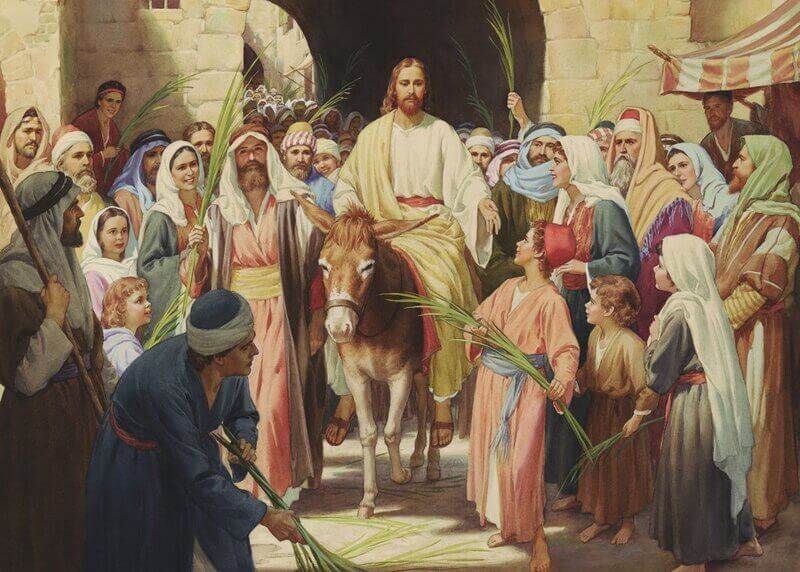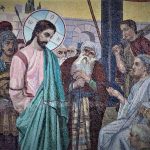Jesus’ Triumphal Entry and the Children’s Praise
For centuries, God had promised a Messiah who would bring salvation and deliverance to the people. Toward the end of his public ministry, Jesus entered Jerusalem with his disciples to present himself as the humble King of the Jews, in fulfillment of those promises. His triumphal entry into Jerusalem was received well by many people but very poorly by others. Who were the people present that day and why did they respond the way they did?
The Messiah’s triumphal entry foretold
Many years before the time of Jesus, the psalmist wrote this of the coming Messiah:
This is the gate of the Lord through which the righteous may enter. I will give you thanks, for you answered me; you have become my salvation. The stone the builders rejected has become the cornerstone; the Lord has done this, and it is marvelous in our eyes. The Lord has done it this very day; let us rejoice today and be glad. Lord, save us! Lord, grant us success! Blessed is he who comes in the name of the Lord. From the house of the Lord we bless you. The Lord is God, and he has made his light shine on us. With boughs in hand, join in the festal procession up to the horns of the altar. (Psalm 118:20-27)
Psalm 118 describes a scene in which the king of Israel would bring salvation and deliverance to the people after being victorious over his enemies. The psalm was probably sung on various occasions as a hymn to celebrate Israel’s deliverance. It was thought by most to ultimately be fulfilled in the Messiah descended from the line of David. The psalm predicts that although the Messiah was to be the cornerstone (chief leader) of God’s chosen nation, the leaders of the nation would mostly reject him. Nevertheless, he would enter Jerusalem through a prominent gate and many people would rejoice over his coming and receive him as Messiah. The people who receive him would form a procession to welcome him into the temple area.
Let’s see how the events in Jesus’ ministry fulfilled what was written in this psalm.
Jesus completes his public ministry
Toward the end of his ministry, Jesus made his way towards Jerusalem with his disciples. He wanted to spend his last days with them in Jerusalem, the center of Jewish culture and religion. He was intentional in his actions, movements, and words, and more so as he entered the city and began to make himself known. Their time in Jerusalem culminated in his bold move to present himself as the Messiah. But he also knew that many would not accept him. The religious leadership especially would not just reject him but reject him decisively and condemn him to death.
Jesus now neared the completion of his earthly ministry. There was little more to say to the people. He had taught them daily—in public, in the countryside, in the temple, and in private. His time of calling the people to faith in him was nearly over. The people would have to decide if he was their Messiah, the One they would trust in for their deliverance. And he was the type of Messiah that God had required—the One that would deliver the people from their sins.
Preparation for Christ’s entry into Jerusalem
Jesus knew what he needed to do to prepare for this great event, and he gave his disciples some simple instructions:
As they approached Jerusalem and came to Bethphage on the Mount of Olives, Jesus sent two disciples, saying to them, “Go to the village ahead of you, and at once you will find a donkey tied there, with her colt by her. Untie them and bring them to me. If anyone says anything to you, say that the Lord needs them, and he will send them right away.” (Matthew 21:1-3)
Matthew records that the Lord acted according to the Messianic prophecy in Zechariah 9:9.
This took place to fulfill what was spoken through the prophet: “Say to Daughter Zion, ‘See, your king comes to you, gentle and riding on a donkey, and on a colt, the foal of a donkey.’” (Matthew 21:4-5)
Jesus entered Jerusalem as King of the Jews on a donkey. In ancient times, it was typical for a king to ride a donkey in a time of peace and stability. Jesus’ act signified that his coming was in peace and not as a conquering warrior. Of course, coming into town on a donkey was contrary to what the leaders and many of the common people expected of the Messiah. They would have thought the king should enter on a grand horse with a full military escort. This of course would have directly challenged the authority of the Roman rule. But this was not to happen, at least not in his first coming. His first coming demonstrated another type of victory, a different kind of triumph.
The triumphal entry
At the beginning of Jesus’ ministry, John the Baptist helped prepare the way for the Messiah. The people were to “Prepare the way for the Lord, make straight paths for him” (Matthew 3:1-3). In other words, they were to prepare straight paths in their hearts to receive the Messiah through repentance and faith. But now on this occasion, instead of repentance, there would be rejoicing and worship.
As was typical for the approach of an ancient king, the people used whatever they had available to honor the king and welcome his entrance into their town.
The disciples went and did as Jesus had instructed them. They brought the donkey and the colt and placed their cloaks on them for Jesus to sit on. A very large crowd spread their cloaks on the road, while others cut branches from the trees and spread them on the road. (Matthew 21:6-8)
The humble king enters Jerusalem
So, Jesus came in humility, a humble king. He identified with the common people who were longing for peace in their land. He brought no regal army or any physical force. His “army” was his entourage of humble followers. His kingdom was one of truth, peace, wisdom, justice, and love.
The crowds that went ahead of him and those that followed shouted, “Hosanna to the Son of David!” “Blessed is he who comes in the name of the Lord!” “Hosanna in the highest heaven!” When Jesus entered Jerusalem, the whole city was stirred and asked, “Who is this?” The crowds answered, “This is Jesus, the prophet from Nazareth in Galilee.” (Matthew 21:9-11)
The people that welcomed Jesus into Jerusalem that day were repeating what was foretold of the Messiah’s entry in Psalm 118. They cried “Hosanna” (which means save), and “Blessed is he who comes in the name of the Lord.” John’s gospel adds this note about how the disciples saw these events:
At first his disciples did not understand all this. Only after Jesus was glorified did they realize that these things had been written about him and that these things had been done to him. (John 12:16)
The common people receive the Messiah
Who were the people in the crowds praising him and welcoming him as their king along the roadway into Jerusalem? They were mostly common people and children—certainly not the elites or the religious leaders. This scene shows that the great majority of people didn’t oppose Jesus’ claim to be the Messiah, even though their understanding of what the Messiah was to accomplish was misguided.
Most of the people were hoping for a conquering king to deliver them from the Romans. But much different than the people expected, Jesus brought spiritual blessings from God: forgiveness, healing, reconciliation with God, deliverance from sin, and victory over death and Satan’s kingdom of darkness. And to enter God’s kingdom, the people had to become like children. They had to humble themselves, acknowledge their sins, and turn to Christ in faith. Of course, those who believed themselves to be righteous wouldn’t see the need for this as they thought God already accepted them.
Entering Jerusalem on a donkey
This wasn’t the first time Jesus entered Jerusalem on a donkey. When Mary his mother was pregnant with Jesus, she and Joseph passed through Jerusalem on their way to Bethlehem. And she was most certainly riding on a donkey, the animal used by the common people. This was Jerusalem’s prelude to the coming of the Messiah—but at that time unseen and unknown to any but a few. And this was true humility: travelling on a common beast of burden to be born in a barn into a poor family. This was the way of Christ, and he followed it from before his birth, during his life, and to the very end.
The children’s praise
After Jesus entered the temple, the children began to praise him:
But when the chief priests and the teachers of the law saw the wonderful things he did and the children shouting in the temple courts, “Hosanna to the Son of David,” they were indignant. “Do you hear what these children are saying?” they asked him. “Yes,” replied Jesus, “have you never read, “‘From the lips of children and infants you, Lord, have called forth your praise’?” (Matthew 21:15-16)
Who were the people that were praising Jesus in the temple area? This time they were mostly children. How appropriate it was that children were the first to announce Jesus as the Son of David, the awaited Messiah. On many occasions, Jesus told his disciples that the kingdom of God belongs to those most like children:
Let the little children come to me, and do not hinder them, for the kingdom of heaven belongs to such as these. (Matthew 19:14)
Noticeably absent after Christ’s triumphal entry were the praises of the religious leaders. They were incensed at the children’s spontaneous outburst of praise. They didn’t recognize Jesus as anyone of importance. In fact, they despised him as he was a threat to their authority.
God rebukes the proud through children
True to character, the religious leaders poured scorn on the children. But to defend them, Jesus quoted from Psalm 8:
From the lips of children and infants you have ordained praise because of your enemies, to silence the foe and the avenger. (Psalm 8:2, NIV, 1984)
Many years before, David himself penned Psalm 8. His psalm warns us that the children’s pure and undefiled praise to God rebukes the arrogant and silences God’s enemies. The children praising Jesus in the temple courts that day were fulfilling prophecy.
We need to take notice whenever the children start praising God. It may be a sign that God is speaking through them to rebuke those who are indifferent to God or who look down on believers and their simplistic faith and exuberant worship. It may also be a sign of judgment on the prideful who think they are above thanking and worshipping God with simple-minded common people.
Shaming the wise and strong
The apostle Paul captured this perfectly when he wrote:
But God chose the foolish things of the world to shame the wise; God chose the weak things of the world to shame the strong. God chose the lowly things of this world and the despised things—and the things that are not—to nullify the things that are, so that no one may boast before him. (1 Corinthians 1:27-29)
God sometimes uses those the world considers foolish, weak, lowly, and despised to shame those who consider themselves wise and strong but are actually foolish and weak in his eyes. His purpose is to bring down the prideful and rebuke the boastful. God prefers to frame his glory with beauty, humility, and simplicity.
Recognizing the Messiah
So, God had to use the innocence of the children to rebuke the religious leaders. These leaders rejected the Christ, and thus rejected God’s plan for their own lives and for their nation. Within a few days, they would conspire to have Jesus tried, condemned, and killed by the Romans. They would formally reject Jesus as their king.
The Messiah came as One unrecognizable to them. Jesus didn’t display the outward superficial power of an earthly ruler, but the hidden power of God’s Messiah through his flawless character, his truth, and his eternal attributes. The image of God was displayed in Jesus clearly and powerfully. And those who were sincerely seeking God and waiting for the Messiah could easily recognize him. All those who put their faith in him were forgiven, redeemed, and transformed.
As the Christian faith spread in the following centuries, the power of Christ’s kingdom had a tremendous effect throughout the world. It’s interesting to note that Jesus’ peaceful rule eventually overshadowed the cruel Roman empire. By the third century, secular Roman rule had diminished, and by the fourth century the Christian faith was becoming dominant where the persecutors of the Christians once ruled. ¹
Responding to the Messiah’s triumphal entry
What about us? Which people in this story do we identify with? Would we have rejoiced at Jesus’ triumphal entry and received him as the Messiah? Would we have we accepted him like the children did, humbling ourselves in repentance and rejoicing at his coming? Or would we have scoffed at the claims of Christ and the simplistic faith and worship of those who believed in him, thinking ourselves to be above it all?
Make this your desire and pledge today: that you will accept him as your Messiah and Savior and give yourself wholeheartedly to his service.
¹ Will Durant, The Story of Civilization, Volume Three, Caesar and Christ, A History of Roman Civilization and of Christianity from their beginnings to A.D. 325, 1944
Christ in Scripture is listed on Feedspot Top 200 Christian Blogs.






